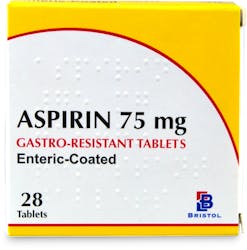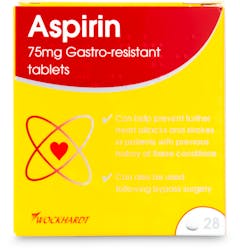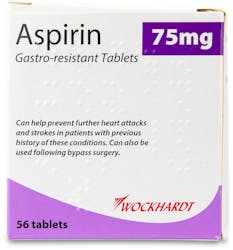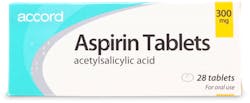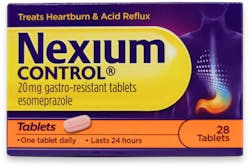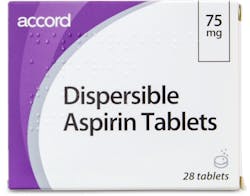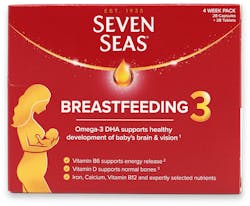Bristol Aspirin 75mg Gastro-Resistant 28 Tablets
Bristol Aspirin 75mg Gastro-Resistant 28 Tablets
All sizes
What 500,000+ customers say about medino:
Get notified when back in stock
Description
Bristol Aspirin 75mg Gastro-Resistant Tablets are formulated to help prevent blood clots, reducing the risk of heart attacks and strokes. Ideal for individuals with a history of cardiovascular events or those who have undergone bypass surgery, these tablets offer a low-dose aspirin solution designed for long-term use.
Key features
- Low-Dose Aspirin: Each tablet contains 75mg of aspirin, suitable for long-term cardiovascular protection.
- Gastro-Resistant Coating: Designed to dissolve in the intestine, reducing the risk of stomach irritation and ulcers.
- Preventative Care: Helps prevent further heart attacks and strokes in individuals with a history of these conditions.
- Post-Surgery Use: Recommended for use after bypass surgery to prevent blood clots.
How does Bristol Aspirin 75mg Gastro-Resistant Tablets work?
These tablets work by inhibiting the aggregation of platelets, which helps prevent the formation of blood clots. The gastro-resistant coating reduces the risk of gastrointestinal issues.
Can I take Bristol Aspirin 75mg Gastro-Resistant Tablets with other medications?
You should consult your doctor before combining these tablets with other medications, especially blood thinners, anti-inflammatory drugs, or corticosteroids, as interactions may occur.
Ingredients
Active Ingredients: Each tablet contains Aspirin 75mg.
Inactive Ingredients: Potato starch, calcium hydrogen phosphate dihydrate E341, microcrystalline cellulose E460, methacrylic acid - ethylacrylate-copolymer (containing soldium lauril sulfate and polysorbate 80), magrocol, simeticone.
Usage and Instructions
For the management of cardiovascular or cerebrovascular disease:
Patients should seek the advice of a doctor before commencing therapy for the first time.
The usual dosage, for long-term use, is 75-150mg once daily. In some circumstances a higher dose may be appropriate, especially in the short term, and up to 300mg a day may be used on the advice of a doctor.
In general, acetylsalicylic acids should be used with caution in elderly patients who are more prone to adverse events. The usual adult dose is recommended in the absence of severe renal or hepatic insufficiency (see sections 4.3 and 4.4). Treatment should be reviewed at regular intervals.
Antithrombotic action:
150mg at diagnosis and 75mg daily thereafter. Tablets taken at diagnosis should be chewed in order to gain rapid absorption.
Children:
Do not give to children aged under 16 years, unless specifically indicated (e.g. for Kawasaki's disease). See section 4.4.
Method of administration:
Aspirin 75mg is for oral administration to adults only.
Take the tablet with water, do not cut, chew or crush the tablet. Swallow whole.
Warnings
Do not give this medicine to children under the age of 16 unless your doctor tells you. This is because there is a possible association between Aspirin and Reye's Syndrome when given to children. Reye's syndrome is a very rare disease, which can be fatal.
Before starting long term use of aspirin you must consult your doctor who will discuss the benefits and risks of this therapy with you. Inform your doctor about the medicines you are taking.
If you are using aspirin regularly seek advice of your doctor before taking any other medicine (including other medicines that you have bought).
Do not take Aspirin 75mg Gastro-Resistant Tablets if you:
Are allergic to Aspirin, NSAIDs which includes those when in attacks of asthma, angioedema, uticaria or rhinitis have been precipitated by aspirin or any other NSAID or any of the other ingredients.
Suffer from gout or had in the past.
Have a stomach ulcer or have had problems with ulcers in the past.
Suffer from haemophilia or any other bleeding condition.
Are taking blood thinning (anti-coagulant) medication.
Are in the last 3 months of pregnancy or are breastfeeding.
Take special care and tell your doctor before taking Aspirin 75mg Gastro-Resistant Tablets if you:
Have liver or kidney disease.
Have asthma or have ever had it in the past.
Are suffering from dehydration (feeling constantly thirsty).
Are intolerant to some sugars as these tablets contain lactose.
Have been told you are deficient in glucose-6-phosphate dehydrogenase.
Tell your doctor or pharmacist before taking Aspirin 75mg Gastro-Resistant Tablets if you are already taking any of the following medicines, as their effectiveness may be influenced by aspirin if they are taken at the same time:
Metoclopramide (for sickness and digestive disorders).
Blood thinning medicines such as Heparin, Warfarin or nicoumalone.
Corticosteroids e.g. hydrocortisone (which can be used for arthritis, asthma and inflammatory conditions).
Anti-inflammatory medicines or steroids for pain and inflammation e.g. ibuprofen.
High blood pressure medicines e.g diuretic/water tablets, Angio-ll receptor antagonists or ACE inhibitors.
Epilepsy medicines e.g. Phenytoin, Sodium valproate.
Methotrexate (for psoriasis, arthritis or tumours).
Antacids for indigestion.
Probenecid or sulphinpyrazone for gout.
Anti depressants e.g. citalopram.
Ask your doctor or pharmacist for advice before taking Dispersible Aspirin 75mg Tablets:
If you are pregnant or breastfeeding. Aspirin should not be taken in the last three months of pregnancy. Do not take this medicine if you are breastfeeding.
Side Effects
Aspirin is generally well-tolerated and most people don't experience side effects. The most common side effects are related to stomach irritation and include abdominal pain, indigestion and nausea. These can mainly be avoided by taking the aspirin with food.
Side effects like ulcers or bleeding in the stomach or intestine are more likely in elderly people and those who've had peptic ulcers in the past. The risk can also be increased by taking certain other medicines.
If your doctor thinks you are at high risk of side effects on the gut you will be prescribed an extra medicine to help protect your gut.
Other possible aspirin side effects include:
- Increased time taken to stop bleeding or other bleeding problems (see below).
- Sensation of ringing, or other noise in the ears (tinnitus).
- Confusion.
- Allergic reactions such as skin rash, swelling of the lips, tongue and throat (angioedema) or narrowing of the airways (bronchospasm or asthma attack - see below).
